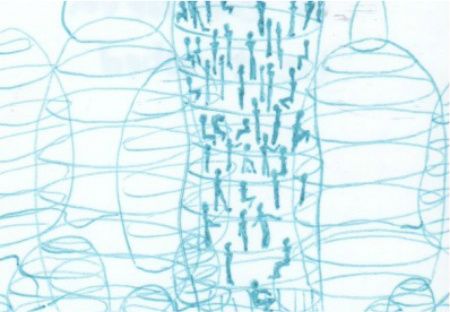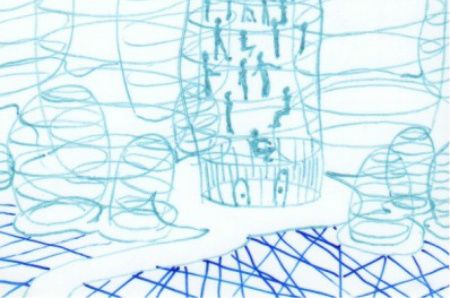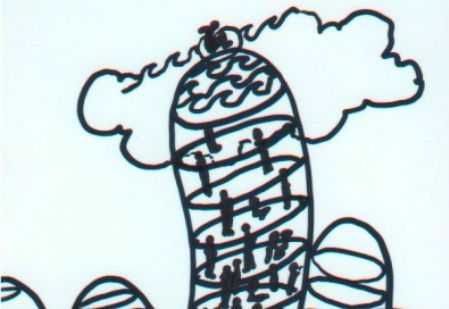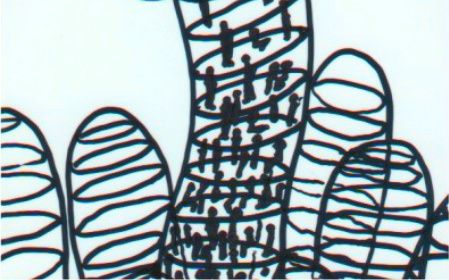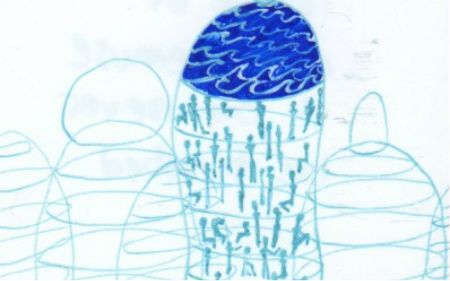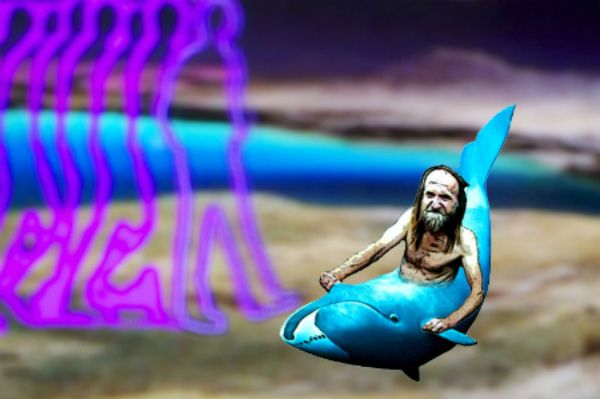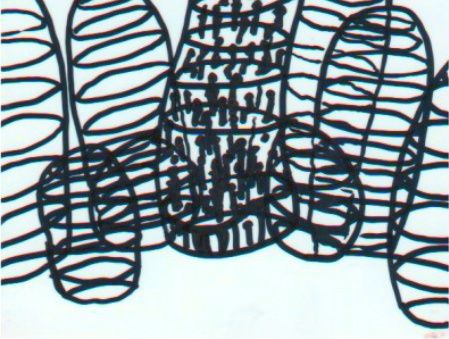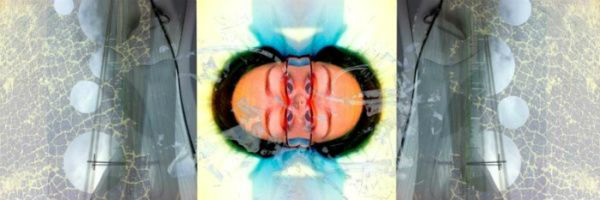
Voices echoing through a pitch black cavern, phasing in and out of audibility...
“I don’t think there’s any doubt he’s dying...” A man’s voice in the darkness. Someone Len hadn’t heard before. “...don’t think we’ll get him into suspension in time, and the ambulance—another twenty minutes minimum. He’s fairly old anyway and—”
The white security guard interrupted, “Mr. Burstein says—”
A woman interrupted him. “I don’t care what he says—he can fire me if he wants!” Len recognized the woman’s voice. Anne. His Anne. “I’m taking care of this man right here and now. Just get the hell out of research!”
“Ms Feldman, hey—listen, we also got to think about deniability, he’s been in this lab, whatever he saw here, he can’t be talking about it out there.”
“I’ll be responsible for that too,” she said.
The unknown man’s voice once more. “You can’t do it without the program’s approval and you can’t get that without using an account—and you don’t have an account to use.”
“We do have one.” Anne’s voice.
A pause. Then his father’s voice, almost whining. “It would give it all to him. And I’ve come so far with this, Anne...”
“Just...” Anne’s voice was fading. “Let’s lift him up on the...” Len was too weak to hear the rest. Strange to think of being too weak simply to hear something. Wasn’t that almost the definition of being dead? Wasn’t that...

“I’ve got him stabilized,” Anne said. “I don’t know for how long.”
If I’m hearing Anne, I’m probably not dead.
Len opened his eyes, and through a blurring filminesss he saw he was in a kind of coffin, with the lid partly tilted back. Sarcophagus.
“Anne...Listen...” His father’s voice. How was that possible. Wasn’t his father dead? “I don’t know how I feel about it...I mean, I’m sorry about the deception but...”
Anne stepped into Len’s line of sight, smiling down at him. The sight of her face struck through him. He was seeing her now—and decades ago. Seeing her hurt expression as he pulled his hand from hers in the vertical farm. Farther back, after their third date: Anne waking up beside him, a sweet, almost maternal look on her face, something like the expression she had now...
She squeezed his hand, her touch strong and warm. “You awake? Your heart gave out, but we’ve got it going again. I don’t think you have a lot of time, though, Leonard, unless we do something radical. You want to see if we can get you to the ER? I’m not sure you’d survive the transition, hon.”
He shook his head. Managed to speak through a throat that felt coated in dust. Rasping, “Stay here with you.” Christ. I’m talking like a four year old.
“Barry, listen...” She was looking at Len’s father, her voice charged with a soft urgency. “Your own son is lying here, dying of old age. Doesn’t that bother you?”
“Of course it does,” Barry said earnestly.
Yeah, right, Len thought. Give him a Daytime Emmy. Were there still Daytime Emmys?
“We have one treatment we can give,” Anne said, gently. “Barry—if I don’t give him your last one, he dies.”
“But—I started my treatment already. You said there’d be a telomerase cascade...” Now he sounded sincere.
“Yes. If you don’t have the last treatment, you’ll start to age, right away. And it’ll happen at an accelerated pace.”
“And then...what? I’ll die? Is my death really the right thing, here? That’s...not fair.”
Len felt a bone-deep weakness creeping up on him, threatening to make his limbs crumble like old timbers with dry rot. Pain was welling up like a slow thick fountain of cold, toxic fluid in his chest. But all that was secondary to an instinctive, visceral sense of pure rejection. There was something primeval in the feeling. His father had rejected his own blood, trading it for vanity.
Len could barely speak. And if he could speak—what would he say to all this? He could never say, “No dad, you should die—not me...”
“Maybe we should ask Len,” Anne suggested, almost too softly to hear.
Don’t do that. Trying to answer that question might kill him. He wanted time to talk to Anne a little more...
He took a deep breath, and made himself speak. “Anne...”
Even that was too much. He fell back into darkness...

Len blinked, cleared his eyes, and stared at the slanting bars of translucent gold, scintillating through the window. He focused, saw that the slanting goldness was simply sunlight and the scintillation was dust particles churning in the light. But the sun seemed unusually vibrant, almost solid. He could feel it humming, inside him...
“You awake, Len?” Anne asked.
He turned his head. Was surprised when the motion didn’t hurt.
She was smiling at him, sitting next to his bed in the clinic recovery room. Soothing pale blue walls. Digital seascapes, the sea moving gently within the frame.
“He...my dad—he gave me the...” He was surprised at the sound of his own voice. It didn’t have that old man’s huskiness anymore.
“Yes.” She looked away, compressed her lips.
“My dad did this for me? He gave up his last treatment to save me?”
She cleared her throat. Sounded almost convincing as she said, “Yes he did.”
Len looked at her. Then he shook his head. “You never had a gift for lying. Lots of talents, you. Not that one. What’d you really do?”
She sighed, and shrugged. “You’re right—he didn’t choose you over himself. I chose. After I did it, he asked me to tell you he’d let you have it—so he could go out with you forgiving him.” She smiled ruefully. “I got fired for it. I’m out of a job. But I gave you his last treatment...”
She shrugged again, reached out and took his hands between hers. Her touch was alive, almost electrical. And he saw that his hands, in hers, were not those of a very old man, nor a very young one. “All the wrong people seem to get rejuvenation. I wanted something for us, Len. We paid our dues.”
Len turned his hands so that her fingers slipped within his.
“Listen...have I said I’m sorry, Anne? I’ve spent the whole second half of my life being sorry I was so stupid...” The touch of her hand in his was as intimate as anything he’d ever felt.

Len waved at the nurse supervisor, and strode past the vital care admission desk, into the hospice hallway. Mahela didn’t recognize him, with the partial rejuvenation.
His father wasn’t in the same room Len had been in—he was on the other side of the building. This window looked to the west and they could see the mercuric expanse of the sea, a quarter mile away, gnawing at the eroding buildings of sunken Santa Monica. Barry could watch the past sinking.
Anne was already there, seated by dad’s bed, holding his hand—holding Barry Winniver’s withered, age spotted hand.
You can’t interfere with stage three, unless you start the stage over. And Barry hadn’t any way to pay for the third stage, once Anne had given it to Len.
The reaction had set in; the telomerase cascade had come; the geriatric regression...
“You look good, son,” said the withered old man, lying in the bed. His voice a croak. But the ironic smile was bright enough. That Winniver smile.
“Thanks.” He had nothing to say that wasn’t awkward. He knew there was no reason he should feel guilty—but he felt vaguely guilty anyway. “I feel good.”
“You can’t get Len all the way to full retread, Anne?” Barry Winniver asked, looking out the window. Barry, “Zach”—Leonard Winniver’s father.
She shook her head. “I couldn’t get away with that—didn’t have access. It was hard enough to get him off the hook for breaking in to Jensen...”
Len put his hand on his father’s bony shoulder. He could feel the aging, the deterioration under his hand. He was stunned at how quickly the reaction had set in—the regression. He took a breath, and tried out his own acting. “You sorry you gave it to me, dad?”
Barry Winniver shook his head. “I was having trouble being a retread. Couldn’t quite live with it.” A weak smile. “So to speak. Maybe ‘Zack’ did drop a hint or two to you on purpose...” He shrugged. “I wanted you to have it, son. Even before you showed up at Jensen...”
Len nodded. Not bad, for a sick old man.
Dad cleared his throat. “I just wish...you could have had it all. Full treatment.”
Len patted his father’s shoulder. “I’m just fine with being forty-five years old, again—biologically forty-five. Thanks, dad. I know it wasn’t easy. I’ve been there. I know how hard it is to face...” Least he could do was let the old man off the hook.
Barry glanced at Anne. “He won’t lose it all of a sudden, like me?”
She shook her head, her lips pressed together. “Nope. Len will age at a normal rate, here on out.” She stood up, patting the old man’s hand, and turned to Len, and said, “We should go, Len. We’ve got a three hour drive down the coast. Your dad needs rest.”
“Sure.”
Len’s father squinted blearily up at his son, frowning, foggily puzzled. It was as if Barry Winniver wasn’t entirely sure how he’d ended up like this—their positions reversed. Not long ago he’d been the strong young man at the bedside. “I don’t know,” his dad said aloud. “I don’t know. But...” Turning his head to gaze again out the window at the old buildings lapped by the sea. “...I’m sorry it took me so long to do the right thing.”
Barry's rheumy old eyes filled with tears. His best performance. Or maybe there was something real in it.
“That’s all right dad.” Len smiled. And continued the pretense. “You saved me in the end.”
“Well, you two...should go,” the old man murmured. “I need to rest.”
Len reached out, and squeezed his father’s hand. Just once.
“Goodbye, dad,” he said.
~ end ~
ELDER CRUISER
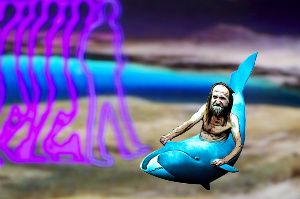
by John Shirley
Be Sure To Return
~Next Friday, the 13th~
when we present
the short tale
SATAN'S DOG
by Gil James Bavel
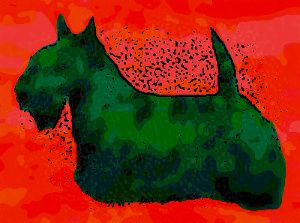
Only on
the FREEZINE of
Fantasy and Science
Fiction

